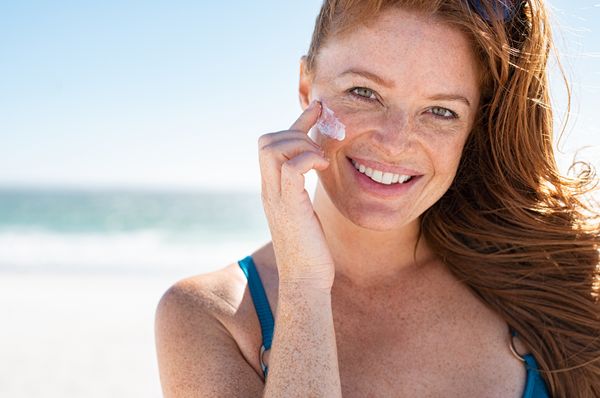Winter is here and it’s time to enjoy all of the cold-weather activities you can only do this time of year. But before you venture outdoors, remember that winter is an environmental vampire that’s constantly sucking the life out of your skin. It sounds dramatic, but it’s also science: Cold air holds less moisture, which causes skin to lose hydration and turn into a frightful flaky, dry and itchy mess.
Now I know you’re thinking the joke’s on winter because you don’t enjoy anything outdoors this time of year. Well, indoor heating is also a moisture-sucking vamp that you can’t escape. So, you have two options: Slather yourself from head to toe in petroleum jelly and retreat into your coffin era for the next three months. Or, try the following tips from Lauren Fine, M.D., a board-certified dermatologist, to help keep your skin healthy all winter long.
Read: 10 Foods for Healthy, Beautiful Skin >>
Try a tub of moisturizer …
The most hydrating formulas tend to be thicker creams and ointments stored in tubs. Lotions and gels in pump bottles tend to be thinner products and are not as hydrating.
… But do not try not a long soak in a bathtub
A hot bath sounds like a good idea on a cold day, but the hotter the water the more moisture and oil you lose. If you want to keep it steamy, limit yourself to 10 minutes max in the tub. Hot showers will also strip your skin of moisture, so the less time you’re in the water the better.
Moisturize after you shower
Your skin absorbs moisture best when you’re fresh out of the water, so apply any heavy creams or moisturizers as soon as you’ve toweled off. This is especially important if your skin is already dry and having trouble absorbing moisture.
Protect your pout
The outermost layer of skin (epidermis) on your lips is thin and your lips don’t contain oil glands, so adding moisture is key during the winter. Instead of a chapstick, try an ointment that may have ingredients that can ultimately make things drier. Apply the ointment a few times a day and stay on top of it: If you’re outside for an extended period of time, reapply every few hours.
Don’t forget sunscreen
Sunscreen should be on your mind and your skin 365 days a year. Try switching to a face and body moisturizer that has SPF in it, so you’ll never forget.
Reassess retinol
Retinol is a popular ingredient in many skincare products, but it can be extra drying in the winter. If you use a retinol product every day and your skin is feeling overly dry or sensitive, cut back to three or four times a week. Or switch to a different formula that isn’t as strong or pair it with a moisturizing face lotion. Put the retinol on first and follow by putting the moisturizer on top of it.
Hydrate, hydrate, hydrate …
You’re probably not as hot and sweaty now as you were in the summer, but you still need to drink lots of water to keep your skin (and body) hydrated. Water is key to preventing dry and flaky skin and helps with elasticity. Aim for nine cups of water a day to keep everything hydrated and healthy.
… Then hydrate some more
Give the skin on your face some extra TLC with a hydrating face mask. Look for options that are labeled “nourishing” or “hydrating” and contain water-retaining hyaluronic acid.
Buy a humidifier
A humidifier adds moisture back into the air so your skin can absorb hydration naturally. Try putting one in your room or the living room — wherever you hang out — to keep dry skin at bay.
Cover up in the cold
If you’re planning to spend a decent amount of time outdoors, cover your skin and your face as much as possible. A light breathable fabric like cotton is a good option for a face covering.
- Why Your Lips Are Chapped (and How to Help Them) ›
- Winter Skin 101 ›
- Must-Know Winter Makeup Tips ›
- 5 Tips for Taking Care of Your Health in Winter ›







